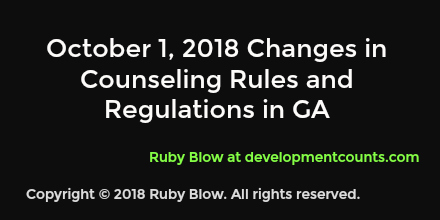Sign of the Times
I simply could not think of a fancy title…so this is it…the topics at the forefront for me this week:
- The Associate Counselor designation in Georgia.
- Private Practices and Agencies who hire Associate Counselors.
- Non-Compete clauses and agreements that include restrictions that are potentially harmful to clients.
These three topics include the intersection of Clinical Supervision, Ethics, and “Trends in the Field.”
The Associate Professional Counselor
As far as I know, the appropriate way to reference those who have been issued an APC by the Georgia Composite Board for Professional Counselors, Social Workers and Marriage & Family Therapists is “Associate Professional Counselor.”
In the board rules under section 135-5.01 section C- Restrictions of Practice, it states that “a person who holds a license as an Associate Professional Counselor may only use the title Associate Professional Counselor.”
As far as I know, this does not represent a change. Instead, it reflects the way the rule was originally written.
This designation has provided a very beneficial and much needed title for those who are working toward independent licensure as a Professional Counselor. What it means is that the approved applicant has met the following requirements:
- a qualifying degree program (with or without a practicum/internship);
- have work in the field (now paid or unpaid/volunteer – with the board approving this structured placement);
- also have supervision in the field; and
- have passed the National Counseling Exam (NCE) or the National Clinical Mental Health Counseling Exam (NCMHCE).
Those who obtain proof of this designation receive a card to print out that looks just like the Professional Counselor license (expect it says Associates Professional Counselor).
The APC has been helpful for those seeking employment, contract work and so on. It has also been useful for employers, including private practices and agencies providing community mental health services.
APC vs. LAPC
Somehow this Associate designation has become commonly known as the LAPC (Licensed Associate Professional Counselor). The term is used frequently by the vast majority of clinicians, supervisors, employers, supervisees and students. Clearly this started because of the phrase “holds a license as an Associate Professional Counselor,” while not noticing the restrictions stated in the board rules.
As a result, graduates enter the field under the APC designation using the working title LAPC. Under this framework –
- their understanding (Supervised Counselor);
- their employer’s understanding;
- the public’s understanding;
- and even some supervisor’s understanding of the APC’s limitations of practice are not as broadly known as is necessary to protect the public.
I believe that the value of the post graduate work toward independent licensure is being under appreciated. Many entering the field view the years of post graduate experience as an unnecessary burden. The “LAPC” induces some to believe that they have arrived after they graduate at a more final destination rather than a next step toward independent licensure.
While obtaining the APC is an accomplishment and preferable to not having an option of a title during the year(s) prior to independent licensure; for at least one recent graduate this led to misunderstanding, disappointment, confusing and even a feeling of being misled!
It is my understanding that APCs cannot practice independently. Meaning the following:
- they cannot set up shop and collect payments made out to them from clients;
- they must have the administrative oversight of an administrative supervisor (who now does not have to physically be on site);
- and the oversight of a clinical supervisor who can and in some case ideally would be off site.
Clinical Supervisor Requirements
The supervisor is typically paid for their services by the supervisee or sometimes by the employer. The supervisor’s role is to aide in the professional development of the supervisee. Below are a few reminders about supervisor’s responsibility and qualifications.
- Technically, the supervisee is practicing under the supervisor’s license.
- In Georgia, the supervisor must be 3-, 2-, or 1-year post independent licensure respectively based on whether or not they have a Masters, Specialists, or Doctorate degree.
- By September 30, 2018 supervisors will be required to have either the CPCS (Certified Professional Counselor Supervisor) credential issued and managed by the LPCA-GA (Licensed Professional Counselors Association of Georgia); or the ACS (Approved Clinical Supervisor) certification issued by the CCE (Center for Credentialing Education). The ACS is a NBCC (National Board of Certified Counselors) credential.
Private Practice
Private Practice is only an option for APCs when they work for someone else which means they have a Director (Administrative Supervisor) and also a Clinical Supervisor.
Many who go into these settings ultimately have the goal of working for themselves when they are both legally able and ready (hopefully based on competency).
The contract between the APC and their employer is typically rife with numerous references to the eventuality that someday the Contractor/Counselor/Supervisee will someday go out on their own.
Practice and even agency owners brace themselves for the time when the APC/Supervisees earn their LPC. Some dread this time because they often face the prospect of a person leaving… the person that they have trained, mentored, supported, earned income from and to whom they have provided referrals and marketing support. This person may leave and work for another practice or start their own practice.
If/when this occurs the business owner risks losing clients in addition to the Clinician and their investment in that Clinician.
It seems to be standard these days that those therapy clients (of the former APC…now LPC) “belong” to the practice or agency.
As a business owner myself, who previously had associate counselors who worked for me, I understand the concerns.
- the financial elements;
- the business model;
- and the hiring challenges.
Putting the Therapy Client First
As a Clinical Supervisor, Clinician and as a humanistic, psychodynamic, systemic and positive psychology practitioner…my biggest concern and loyalty is to the client.
All of our ethical decision making models place the client first in consideration when there are conflicts like competing interests. I contend that the clients should be assisted with choosing to stay with the practice or continuing with their therapist who is leaving.
Therapists are not as interchangeable for clients as we would like to believe. Perhaps some service modalities are more interchangeable than others. However, relationally centered psychotherapy often involves the therapeutic relationship being very important to clients.
This bond helps facilitate the corrective emotional experiences that are valued in long term therapy in particular. I’m not saying that there are any easy answers. In my own contracts I asked for a specific radius distance from my practice (I think 5 miles), if and when they started their own business.
I respected those who said that that contract/agreement would not work for them and thus they did not sign the agreement, just as much as those who went on to work for my practice. According to our GA Code of Ethics (135-7) we have obligations to Clients and to Colleagues.
- Our obligations to clients include not exploiting them for financial gain; as well as informing them if we have a contractual agreement with a third party that could impact their treatment.
- Our obligations to colleagues include not soliciting clients from colleagues or taking on the responsibility of a provider for a client without consent from the colleague or the organization.
Supervisees and employers need to be cautious about exploiting clients and Supervisees need to make sure clients are informed at the outset of treatment that if the Counselor (supervisee/APC…soon to be LPC) leaves the setting the client may not have an option to continue treatment with them (the Counselor).
I don’t think people are entitled to work in someone’s practice and “take” the clients when they leave to start their own business or work in another setting.
I do think that clients should have the right to choose…and I think that we have a responsibility not to stand in their way or make it difficult for them to choose their own provider where it is possible for them to make that choice.
Copyright © 2016 Ruby Blow. All rights reserved.
Share your thoughts on Linkedin, Facebook, Twitter





